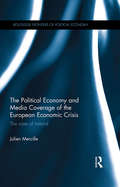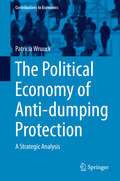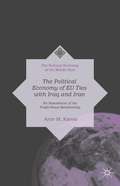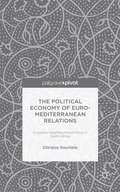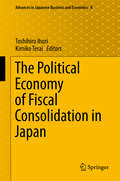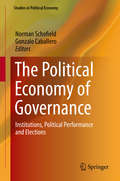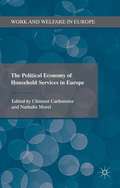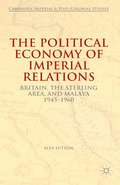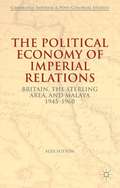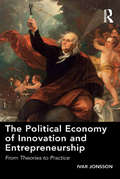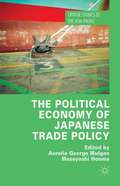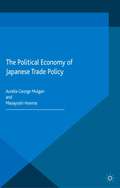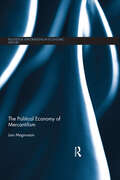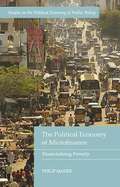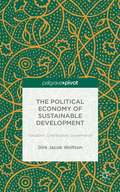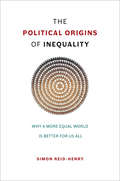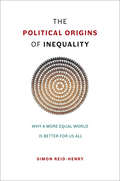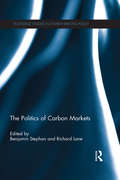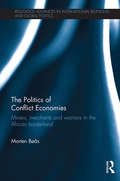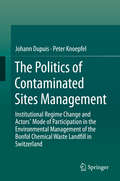- Table View
- List View
The Political Economy and Media Coverage of the European Economic Crisis: The case of Ireland (Routledge Frontiers of Political Economy)
by Julien MercilleThe European economic crisis has been ongoing since 2008 and while austerity has spread over the continent, it has failed to revive economies. The media have played an important ideological role in presenting the policies of economic and political elites in a favourable light, even if the latter’s aim has been to shift the burden of adjustment onto citizens. This book explains how and why, using a critical political economic perspective and focusing on the case of Ireland. Throughout, Ireland is compared with contemporary and historical examples to contextualise the arguments made. The book covers the housing bubble that led to the crash, the rescue of financial institutions by the state, the role of the European institutions and the International Monetary Fund, austerity, and the possibility of leaving the eurozone for Europe’s peripheral countries. Through a systematic analysis of Ireland’s main newspapers, it is argued that the media reflect elite views and interests and downplay alternative policies that could lead to more progressive responses to the crisis.
The Political Economy of Anti-dumping Protection
by Patricia WruuckThis book deals with anti-dumping measures (AD) and investigates two questions: First, what country characteristics affect AD use and notably, do domestic political institutions have an effect? Second, (how) is the decision to impose a new AD measure affected by anticipation of trading partners' potential retaliation? This book applies a strategic perspective to AD to address these questions, presenting a game-theoretic model together with an empirical test. The approach sheds light on the dynamics of interaction between trading partners and allows to capture selection processes which underpin the trade restrictions that can actually be observed. The book provides a fresh look on when and how trading powers apply antidumping measures, how this is shaped by strategic interaction and whether institutions do make a difference to the outcome. In a period in which the international trading system has to cope with numerous stresses such as an increased resort to administered protection largely by big emerging economies, this is a timely and important contribution. Dr. Klaus Günter Deutsch, Managing Director, Research, Economic and Industrial Policy, German Federation of Industries This book successfully integrates two research traditions in international politics - the traditional view that looks at domestic factors of anti-dumping policies and the strategic view that conditions the imposition of anti-dumping measures on the likely, retaliatory behavior of the trading partner. The result is an informative and constructive examination of anti-dumping protection and trade wars in the WTO. Prof. Dr. Thomas Bräuninger, Chair of Political Economy, University of Mannheim, Germany "The Political Economy of Anti-Dumping Protection - A Strategic Analysis" is a major contribution to the important and growing field international political economy. Starting with the "traditional" comparative institutional analysis, which focuses on the implications of democratic and non-democratic regimes for using anti-dumping measures in trade politics, the second part applies a strategic perspective on this type of sanctions uncovering the dynamic interactions between a challenging and challenged countries. For all those interested in understanding the logic of sanctions, the role of institutions, and in how to examine the implications of theoretical models for international political economy this book is a "must read". Prof. Dr. Thomas König, Chair of Political Science II, University of Mannheim, Germany.
The Political Economy of Conflict in South Asia
by Matthew J. Webb Albert WijeweeraDestructive conflicts have thwarted growth and development in South Asia for more than half a century. This collection of multi-disciplinary essays examines the economic causes and consequences of military conflict in South Asia from a variety of perspectives embracing fiscal, social, strategic, environmental and several other dimensions.
The Political Economy of EU Ties with Iraq and Iran
by Amir M. KamelThis book analyzes the failure of the EU's peace-through-trade policy in Iraq and Iran between 1979 and 2009 from a theoretical and empirical perspective. The author adds to the trade-peace theory debate and provides evidence supporting the need to review the EU's peace-through-trade-policy towards Iraq and Iran, and in general.
The Political Economy of Euro-Mediterranean Relations: European Neighbourhood Policy in North Africa
by Christos KourtelisThe author analyses the implementation of the agricultural and industrial parts of the European Neighbourhood Policy (ENP) in Egypt, Tunisia and Morocco. This study forms the first comprehensive attempt to examine the EU-led reforms and initiatives in the two sectors up until the beginning of the Arab Spring. It also evaluates the development of the policy after the changes of the regimes in Tunisia and Egypt until the 2014 elections which brought Sisi in power in Egypt and Essebsi in Tunisia. Following a sectoral approach to assess the implementation of the ENP, Christos Kourtelis investigates which interest groups win and which lose from the policy.
The Political Economy of Fiscal Consolidation in Japan
by Toshihiro Ihori Kimiko TeraiThis book investigates the reasons for persistent public deficits and delayed fiscal reform in Japan, placing a special emphasis on political economy aspects. Japan is confronted with the need to pursue fiscal discipline for fiscal consolidation and implement structural reforms for reorganizing fiscal expenditures. Focusing on particular policy fields including social security, female labor supply, public works, and intergovernmental transfer schemes, the book clarifies economic and political elements that have hindered effective steps toward these two goals. Facing population aging and a business downturn, the Japanese government was urged to increase social security expenditures and the budget for Keynesian stimulus policies. As elucidated in the book, the institutional design has worked to over-represent the demands of elderly generations and local interest groups and to expand these expenditures. Rigorous theoretical and numerical analyses reported throughout the book consequently provide readers with insights into incentive designs and institutional reforms necessary for fiscal consolidation, also presenting points of view for public policy and public debate.
The Political Economy of Governance
by Norman Schofield Gonzalo CaballeroUnderstanding the governance of nations is a key challenge in contemporaneous political economy. This book provides new advances and the latest research in the field of political economy, dealing with the study of institutions, governance, democracy and elections. The volume focuses on issues such as the role of institutions and political governance in society, the working of democracy and the electoral performance in several case studies. The chapters involve cutting edge research on many different countries, including the USA, Great Britain, Germany, Spain and the Third World. The authors of the chapters are leading scholars in political economy from America, Europe and Asia.
The Political Economy of Household Services in Europe (Work And Welfare In Europe)
by Nathalie Morel Clément CarbonnierThe Political Economy of Household Services in Europe.
The Political Economy of Household Services in Europe (Work and Welfare in Europe)
by Clément CarbonnierThis edited volume assesses from a variety of perspectives the policies introduced to support the development of household services across Europe. It highlights the impact of these costly policies on the creation of low quality jobs and on labour market dualisation, and questions their social and economic outcomes.
The Political Economy of Imperial Relations: Britain, the Sterling Area, and Malaya 1945-1960 (Cambridge Imperial and Post-Colonial Studies Series)
by Alex SuttonThe Political Economy of Imperial Relations offers a much needed historical and theoretical intervention into the relationship between Britain and Malaya after the Second World War. It challenges existing accounts and details a strong continuity in this relationship from 1945 until 1960.
The Political Economy of Imperial Relations: Britain, the Sterling Area, and Malaya 1945-1960 (Cambridge Imperial and Post-Colonial Studies)
by Alex SuttonThe Political Economy of Imperial Relations offers a much needed historical and theoretical intervention into the relationship between Britain and Malaya after the Second World War. It challenges existing accounts and details a strong continuity in this relationship from 1945 until 1960.
The Political Economy of Innovation and Entrepreneurship: From Theories to Practice
by Ivar JonssonThis book offers a general theoretical framework for approaching innovation and entrepreneurship, using practical and up-to-date examples to demonstrate three different levels of innovation and entrepreneurship: the macro-level, which concerns the impact of innovation activity on economic growth and production systems; the meso-level, which concerns the relations between firms, research institutes and governmental bodies and their role in innovation activity; and the micro-level, which concerns the dynamics of innovations within firms and organisations. Providing a critical overview of existing research and demonstrating the importance of a transdisciplinary framework for studies of innovation and entrepreneurship, the author advances a general concept of ’collective entrepreneurship’ that emphasises the social and collaborative nature of innovation and entrepreneurship, thus shedding light on processes of innovation and entrepreneurship as active practices of social construction. As such, it will appeal to scholars of economic sociology, political science, economic geography and economists, as well as those with interests in innovation policy.
The Political Economy of Japanese Trade Policy (Critical Studies of the Asia-Pacific)
by Aurelia George Mulgan Masayoshi HonmaThe Political Economy of Japanese Trade Policy.
The Political Economy of Japanese Trade Policy (Critical Studies of the Asia-Pacific)
by Aurelia George Mulgan Masayoshi HonmaThis study provides up-to-date coverage of the most important domestic and external political and economic influences on Japanese trade policy, as well as the evolutionary dynamics of that policy in the post-war period.
The Political Economy of Mercantilism (Routledge Explorations in Economic History)
by Lars MagnussonSince the days of Adam Smith, Mercantilism has been a hotly debated issue. Condemned at the end of the 18th century as a "false" system of economic thinking and political practice, it has returned paradoxically to the forefront in regard to issues such as the creation of economic growth in developing countries. This concept is often used in order to depict economic thinking and economic policy in early modern Europe; its meaning and content has been highly debated for over two hundred years. Following on from his 1994 volume Mercantilism – The Shaping of an Economic Language, this new book from Lars Magnusson presents a more synthetic interpretation of Mercantilism not only as a theoretical system, but also as a system of political economy. This book incorporates samples of material from the 1994 publication alongside new material, ordered in a new set of chapters and up-date discussions on mercantilism up to the present day. Tracing the development of a particular political economy of Mercantilism in a period of nascent state making in Western and Continental Europe from the 16th to the 18th century, the book describes how European rulers regarded foreign trade and industrialisation as a means to achieve power and influence amidst international competition over trades and markets. Returning to debates concerning whether Mercantilism was a system of power or of wealth, Magnusson argues that it is in fact was both, and that contemporaries almost without exception saw these goals as interconnected. He also emphasises that Mercantilism was an all-European issue in a time of trade wars and the struggle for international power and recognition. In examining these issues, this book offers an unrivalled modern synthesis of Mercantilist ideas and practices.
The Political Economy of Microfinance
by Philip MaderThis book helps to understand the enigmatic microfinance sector by tracing its evolution and asking how it works as a financial system. Our present capitalism is a financialized capitalism, and microfinance is its response to poverty. Microfinance has broad-ranging effects, reaching hundreds of millions of people and generating substantial revenues. Although systemic flaws have become obvious, most strikingly with the 2010 Indian crisis that was marked by overindebtedness, suicides and violence, the industry's expansion continues unabated. As Philip Mader argues, microfinance heralds less the end of poverty than new, more financialized forms of poverty. While microfinance promises to empower, it generates discipline and extracts substantial resources from the poor, producing new crises and new forms of dispossession.
The Political Economy of Rare Earth Elements: Rising Powers and Technological Change (International Political Economy Series)
by Ryan David KigginsThe contributors argue that rare earths are essential to the information technology revolution on which humans have come to depend for communication, commerce, and, increasingly, engage in conflict. They demonstrate that rare earths are a strategic commodity over which political actors will and do struggle for control.
The Political Economy of Sustainable Development: Valuation, Distribution, Governance
by Dirk Jacob WolfsonThe author shows how sustainable development may be organized, valued and distributed by introducing situational contracting as an interactive and contextual mode of governance. Situational contracting provides a road map for where we want to go, serving the prevailing ideology in implementing the trade between efficiency and fairness.
The Political Origins of Inequality
by Simon Reid-HenryInequality is the defining issue of our time. But it is not just a problem for the rich world. It is the global 1% that now owns fully half the world's wealth--the true measure of our age of inequality. In this historical tour de force, Simon Reid-Henry rewrites the usual story of globalization and development as a story of the management of inequality. Reaching back to the eighteenth century and around the globe, The Political Origins of Inequality foregrounds the political turning points and decisions behind the making of today's uneven societies. As it weaves together insights from the Victorian city to the Cold War, from US economic policy to Europe's present migration crisis, a true picture emerges of the structure of inequality itself. The problem of inequality, Reid-Henry argues, is a problem that manifests between places as well as over time. This is one reason why it cannot be resolved by the usual arguments of left versus right, bound as they are to the national scale alone. Most of all, however, it is why the level of inequality that confronts us today is indicative of a more general crisis in political thought. Modern political discourse has no place for public reason or the common good. Equality is yesterday's dream. Yet the fact that we now accept such a world--a world that values security over freedom, special treatment over universal opportunity, and efficiency over fairness--is ultimately because we have stopped even trying in recent decades to build the political architecture the world actually requires. Our politics has fallen out of step with the world, then, and at the every moment it is needed more than ever. Yet it is within our power to address this. Doing so involves identifying and then meeting our political responsibilities to others, not just offering them the selective charity of the rich. It means looking beyond issues of economics and outside our national borders. But above all it demands of us that we reinvent the language of equality for a modern, global world: and then institute this. The world is not falling apart. Different worlds, we all can see, are colliding together. It is our capacity to act in concert that is falling apart. It is this that needs restoring most of all.
The Political Origins of Inequality: Why a More Equal World Is Better for Us All
by Simon Reid-HenryInequality is the defining issue of our time. But it is not just a problem for the rich world. It is the global 1% that now owns fully half the world’s wealth—the true measure of our age of inequality. In this historical tour de force, Simon Reid-Henry rewrites the usual story of globalization and development as a story of the management of inequality. Reaching back to the eighteenth century and around the globe, The Political Origins of Inequality foregrounds the political turning points and decisions behind the making of today’s uneven societies. As it weaves together insights from the Victorian city to the Cold War, from US economic policy to Europe’s present migration crisis, a true picture emerges of the structure of inequality itself. The problem of inequality, Reid-Henry argues, is a problem that manifests between places as well as over time. This is one reason why it cannot be resolved by the usual arguments of left versus right, bound as they are to the national scale alone. Most of all, however, it is why the level of inequality that confronts us today is indicative of a more general crisis in political thought. Modern political discourse has no place for public reason or the common good. Equality is yesterday’s dream. Yet the fact that we now accept such a world—a world that values security over freedom, special treatment over universal opportunity, and efficiency over fairness—is ultimately because we have stopped even trying in recent decades to build the political architecture the world actually requires. Our politics has fallen out of step with the world, then, and at the every moment it is needed more than ever. Yet it is within our power to address this. Doing so involves identifying and then meeting our political responsibilities to others, not just offering them the selective charity of the rich. It means looking beyond issues of economics and outside our national borders. But above all it demands of us that we reinvent the language of equality for a modern, global world: and then institute this. The world is not falling apart. Different worlds, we all can see, are colliding together. It is our capacity to act in concert that is falling apart. It is this that needs restoring most of all.
The Politics of Advanced Capitalism
by Pablo BeramendiThis book serves as a sequel to two distinguished volumes on capitalism: Continuity and Change in Contemporary Capitalism (Cambridge, 1999) and Order and Conflict in Contemporary Capitalism (1985). Both volumes took stock of major economic challenges advanced industrial democracies faced, as well as the ways political and economic elites dealt with them. However, during the last decades, the structural environment of advanced capitalist democracies has undergone profound changes: sweeping deindustrialization, tertiarization of the employment structure, and demographic developments. This book provides a synthetic view, allowing the reader to grasp the nature of these structural transformations and their consequences in terms of the politics of change, policy outputs, and outcomes. In contrast to functionalist and structuralist approaches, the book advocates and contributes to a 'return of electoral and coalitional politics' to political economy research.
The Politics of African Industrial Policy
by Lindsay WhitfieldThis book engages in the debate on growth versus economic transformation and the importance of industrial policy, presenting a comprehensive framework for explaining the politics of industrial policy. Using comparative research to theorize about the politics of industrial policy in countries in the early stages of capitalist transformation that also experience the pressures of elections due to democratization, this book provides four in-depth African country studies that illustrate the challenges to economic transformation and the politics of implementing industrial policies.
The Politics of Carbon Markets (Routledge Studies in Environmental Policy)
by Richard Lane Benjamin StephanThe carbon markets are in the middle of a fundamental crisis - a crisis marked by collapsing prices, fleeing actors, and ever increasing greenhouse gas levels. Yet carbon trading remains at the heart of global attempts to respond to climate change. Not only this, but markets continue to proliferate - particularly in the Global South. The Politics of Carbon Markets helps to make sense of this paradox and brings two urgently needed insights to the analysis of carbon markets. First, the markets must be understood in relation to the politics involved in their development, maintenance and opposition. Second, this politics is multiform and pervasive. Implementation of new techniques and measuring tools, policy development and contestation, and the structuring context of institutional settings and macro-social forces all involve a variety of political actors and create new forms of political agency. The contributions study the total extent of the carbon markets, from their prehistory to their contemporary expansion and wider impacts. This wide-ranging political perspective on the carbon markets is invaluable to those studying and interested in ecological markets, climate change governance and environmental politics.
The Politics of Conflict Economies: Miners, merchants and warriors in the African borderland (Routledge Advances in International Relations and Global Politics)
by Morten BøåsConflict economies cannot be approached in isolation but must instead be contextualised socially and historically. These economies did not emerge in vacuum, but are part and parcel of the history of people and place. This book explores the informal and illicit extraction and trade of minerals and other types of natural resources that takes place in the 'borderlands' during periods of conflict. This type of extraction and marketing, often referred to as ‘conflict trade’ depends on a weak state, and works alongside the structures of the state and its officials. The book emphasises that conflicts do not start as competition over natural resources and in turn suggests that the integration of the extraction and marketing of natural resources only starts once fighting is well under way. Boas argues that although economic agendas are an integral part of African conflicts, the desire to accumulate is not the only motivation. Thus, in order to present a more comprehensive analysis of conflict we need to take into account political, cultural, and historical factors, in addition to the economic dimensions of conflict. This book will be of very strong interest to students and scholars of political economy, conflict studies, international relations and development.
The Politics of Contaminated Sites Management
by Johann Dupuis Peter KnoepfelBy the end of the 1970s, contaminated sites had emerged as one of the most complex and urgent environmental issues affecting industrialized countries. The authors show that small and prosperous Switzerland is no exception to the pervasive problem of sites contamination, the legacy of past practices in waste management having left some 38,000 contaminated sites throughout the country. This book outlines the problem, offering evidence that open and polycentric environmental decision-making that includes civil society actors is valuable. They propose an understanding of environmental management of contaminated sites as a political process in which institutions frame interactions between strategic actors pursuing sometimes conflicting interests. In the opening chapter, the authors describe the influences of politics and the power relationships between actors involved in decision-making in contaminated sites management, which they term a "wicked problem. " Chapter Two offers a theoretical framework for understanding institutions and the environmental management of contaminated sites. The next five chapters present a detailed case study on environmental management and contaminated sites in Switzerland, focused on the Bonfol Chemical Landfill. The study and analysis covers the establishment of the landfill under the first generation of environmental regulations, its closure and early remediation efforts, and the gambling on the remediation objectives, methods and funding in the first decade of the 21st Century. The concluding chapter discusses the question of whether the strength of environmental regulations, and the type of interactions between public, private, and civil society actors can explain the environmental choices in contaminated sites management. Drawing lessons from research, the authors debate the value of institutional flexibility for dealing with environmental issues such as contaminated sites.
